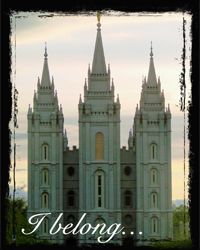The Prophet Joseph Smith received the Word of Wisdom in the Newel K. Whitney store.
Brigham Young: I think I am as well acquainted with the circumstances which led to the giving of the Word of Wisdom as any man in the Church, although I was not present at the time to witness them. The first school of the prophets was held in a small room situated over the Prophet Joseph's kitchen, in a house, which belonged to Bishop [Newel K.] Whitney, and which was attached to his store, which store probably might be about fifteen feet square. In the rear of this building was a kitchen, probably ten by fourteen feet, containing rooms and pantries. Over this kitchen was situated the room in which the Prophet received revelations and in which he instructed his brethren.
The brethren came to that place for hundreds of miles to attend school in a little room probably no larger than eleven by fourteen. When they assembled together in this room after breakfast, the first [thing] they did was to light their pipes, and, while smoking, talk about the great things of the kingdom, and spit all over the room, and as soon as the pipe was out of their mouths a large chew of tobacco would then be taken. Often when the Prophet entered the room to give the school instructions he would find himself in a cloud of tobacco smoke. This, and the complaints of his wife at having to clean so filthy a floor, made the Prophet think upon the matter, and he inquired of the Lord relating to the conduct of the Elders in using tobacco, and the revelation known as the Word of Wisdom was the result of his inquiry.
The Word of Wisdom wasn’t issued as a commandment when it was first given. From time to time, between 1834 and 1880, Church leaders exhorted the Saints to obey the Word of Wisdom, but they did not see fit to require obedience. However, in 1880 under John Taylor's presidency, President George Q. Cannon presented to the Church membership a new edition of the Pearl of Great Price and the Doctrine and Covenants and declared: "It has been deemed wise to submit these books with their contents to the conference, to see whether the conference will vote to accept the books and their contents as from God, and binding upon us as a people and as a Church." President Joseph F. Smith seconded the motion, and the conference sustained the proposition by unanimous vote.
Here the Saints acknowledged to the Lord their desire to have his "order and will" become commandment. In 1913 President Joseph F. Smith, reviewing the Church's gradual compliance with the Word of Wisdom, wrote: “The reason undoubtedly why the Word of Wisdom was given—as not by 'commandment or [constraint] was that at that time, at least, if it had been given as a commandment, it would have brought every man addicted to the use of these noxious things under condemnation; so the Lord was merciful and gave them a chance to overcome, before he brought them under the law.” When the Lord's timetable was fulfilled, it was Heber J. Grant who made this law once and for all binding on the Saints.
So is the Word of Wisdom a commandment now?
President Brigham Young: I know that some say it [the Word of Wisdom] is not given by way of commandment. Very well, but we are commanded to observe every word that proceeds from the mouth of God.
At the October, 1937, General Conference, President Heber J. Grant spoke as follows:
We expect all the General Officers of the Church, each and every one of them, from this very day, to be absolute, full-tithepayers, to really and truly observe the Word of Wisdom; and we ask all of the officers of the Church and all members of the General Boards, and all Stake and Ward officers, if they are not living the Gospel and honestly and conscientiously paying their tithing, to kindly step aside, unless from this day they live up to these provisions. No Latter-day Saint is entitled to anything that is contrary to the mind and will of the Lord, and the Word of Wisdom is the mind and the will of the Lord.
John A. Widtsoe: [The Word of Wisdom] was given "by revelation and the word of wisdom, showing forth the order and the will of God." It came by "revelation" and not because of the likes or dislikes of the Prophet. Whatever is "the will of God", men are required to do, if they wish full salvation. The Word of Wisdom is the will of God, hence binding upon all who desire to show full obedience to the principles of the plan of the Lord for human welfare. God's human children may accept or reject the truths of the Word of Wisdom—it is their privilege—but they lose by disobedience the blessings promised the obedient.
skip to main |
skip to sidebar

I have the wonderful opportunity to teach Gospel Doctrine in my ward. This blog is my way of capturing the many thoughts that come from my lesson preparation -- thoughts that sometimes never make it into my lessons because of time constraints or because they simply don't fit in with the lesson objective. I hope that you will share your thoughts about the Gospel Doctrine course of study -- whether you are the teacher or the student.
My Other Blog
Labels
- Book of Mormon (4)
- Church History (3)
- Doctrine and Covenants (13)
- New Testament (10)
- Old Testament (5)
- Pearl of Great Price (1)
- Trivia (14)


